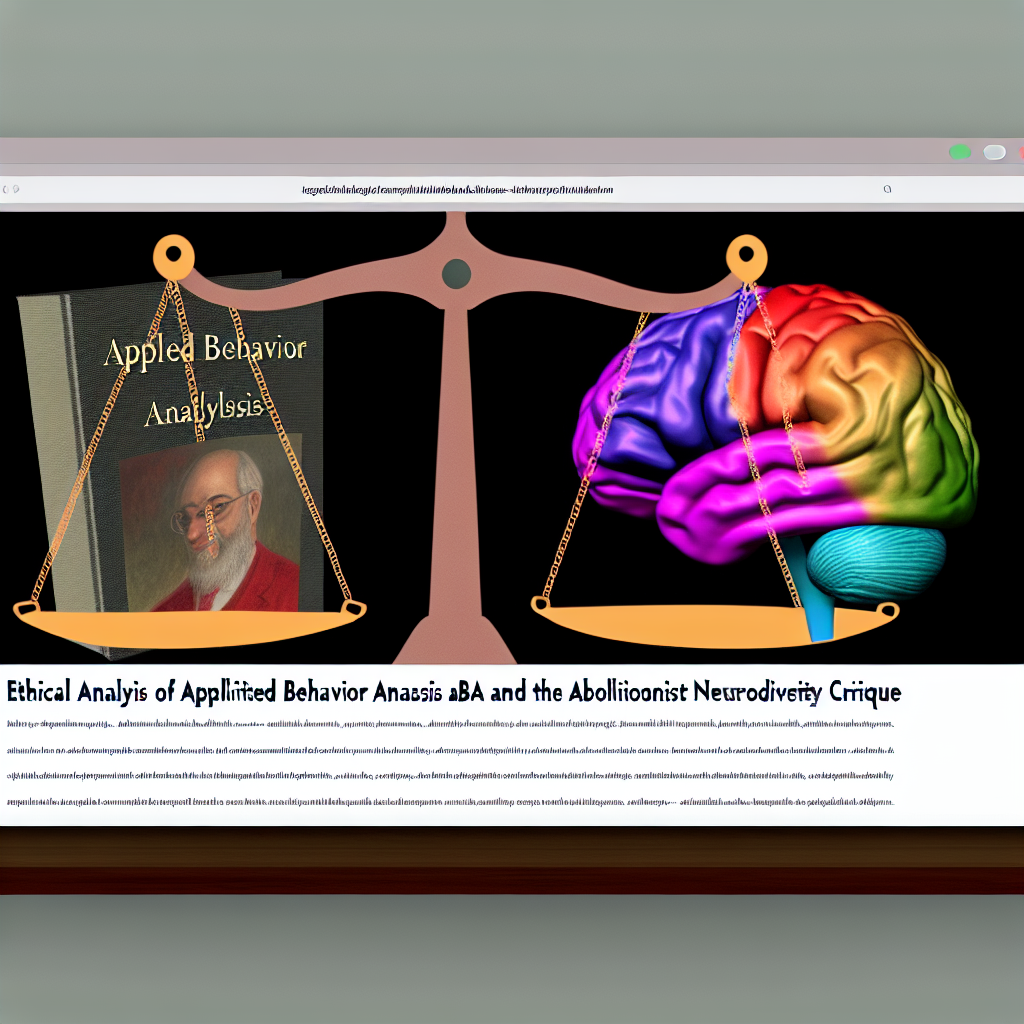Ethical Analysis of Applied Behavior Analysis (ABA) and the Abolitionist Neurodiversity Critique
Introduction
Applied Behavior Analysis (ABA) has been a widely used intervention for autistic individuals, focusing on teaching communication, social, and adaptive skills. However, significant controversy surrounds ABA, particularly from the neurodiversity movement. Some advocates argue that ABA is unethical because it seeks to "normalize" autistic individuals rather than support them in developing in ways that align with their own neurotype.
This blog post explores the recent ethical analysis by Abraham Graber & Jessica Graber, published in Behavior Analysis in Practice (2023). Their paper, "Applied Behavior Analysis and the Abolitionist Neurodiversity Critique: An Ethical Analysis" (DOI: 10.1007/s40617-023-00780-6), examines the abolitionist critique of ABA and discusses ethical concerns behavior analysts should consider.
Understanding the Neurodiversity Movement
What is Neurodiversity?
The neurodiversity movement views autism as a mere-difference rather than a bad-difference. This means autism is a natural variation of human neurology, not something that needs to be fixed or cured. Key beliefs of neurodiversity include:
- Autism should be recognized as a legitimate identity rather than a disorder.
- Many challenges faced by autistic individuals stem from societal barriers, not autism itself.
- Pathologizing autism reinforces ableism and stigma.
Key Tenets of the Neurodiversity Perspective
Advocates for neurodiversity argue that:
- Autism is an integral part of identity that should be accepted, not changed.
- Efforts to make autistic individuals behave neurotypically enforce harmful conformity.
- Teaching self-advocacy and accommodations is more ethical than enforcing "normal" behaviors.
The Abolitionist Critique of ABA
The abolitionist neurodiversity critique argues that ABA fundamentally assumes autistic individuals need to change to fit societal norms. Critics raise ethical concerns, pointing to potential harm caused by ABA practices.
Core Concerns Raised by Autistic Advocates
- ABA prioritizes making autistic individuals act "normal." Goals often emphasize neurotypical behaviors rather than helping the individual thrive in their own way.
- ABA interventions can reinforce ableism. Teaching autistic individuals to suppress natural behaviors (such as stimming) can contribute to self-esteem issues.
- Autistic individuals report trauma from ABA. Some describe their experiences as dehumanizing or stressful.
- Early Intensive Behavioral Intervention (EIBI) is exhausting. Some autistic adults argue that requiring 20–40 hours of therapy per week can be overwhelming.
- Ethical concerns about compliance-based training. Teaching unquestioning compliance can make individuals vulnerable to exploitation or abuse.
- Masking neurodivergent traits negatively impacts mental health. Research links masking to increased anxiety, depression, and burnout.
- Social validity concerns. The effectiveness of ABA should be measured based on autistic individuals’ own perspectives, not just external behavioral changes.
- Resistance from ABA practitioners to autistic critique. Many autistic advocates feel that the ABA field dismisses their concerns rather than addressing them.
Some critics go so far as to compare ABA to conversion therapy for LGBTQ+ individuals, arguing that both share an underlying goal of making people conform to societal norms rather than embracing their identity.
Evaluating the Critique: When is ABA Ethical?
While some argue for the abolition of ABA entirely, others believe the field can evolve to become more ethical. Behavior analysts must consider:
- Should ABA focus on masking autistic traits? Encouraging individuals to suppress stimming or forced eye contact may do more harm than good.
- How can ABA teach skills without enforcing neurotypical conformity? Focusing on functional skills that improve quality of life—without requiring the elimination of autistic behaviors—can be more ethical.
- Whose perspective matters in therapeutic goals? The voices of autistic individuals must be central when designing intervention strategies.
Ethical Considerations for Behavior Analysts
Given the critiques above, behavior analysts should assess their practices to ensure they align with ethical standards. Key considerations include:
- Prioritizing self-advocacy over compliance. Instead of focusing on eliminating certain behaviors, interventions should support self-expression and autonomy.
- Ensuring client-centered goals. Therapy should align with an individual’s personal needs, rather than external pressures to conform.
- Listening to autistic voices. The perspectives of autistic self-advocates should inform ethics decisions in behavior analysis.
- Adjusting interventions based on lived experiences. If autistic individuals report harm from certain interventions, those practices should be re-evaluated.
- Reducing stigmatizing language in ABA. Words like "deficits" and "disordered" can reinforce negative perceptions of autism.
Conclusion
The ethical concerns about ABA raised by the neurodiversity movement, particularly its abolitionist branch, highlight the need for critical reflection within the field of behavior analysis. While some argue ABA should be abolished, others believe it can evolve to be more ethical by prioritizing autonomy, self-advocacy, and well-being over compliance and normalization.
For behavior analysts, engaging with these ethical conversations is critical. Are we supporting autistic individuals in ways that truly enhance their quality of life? How can interventions be adapted to align with an individual's needs rather than societal expectations?
Further Reading
For a deeper exploration of these ethical concerns, read the full paper:
Graber, A., & Graber, J. (2023). Applied Behavior Analysis and the Abolitionist Neurodiversity Critique: An Ethical Analysis.
DOI: 10.1007/s40617-023-00780-6
By staying informed on these discussions, behavior analysts can work toward more ethical and meaningful practices that align with the rights and dignity of autistic individuals.



